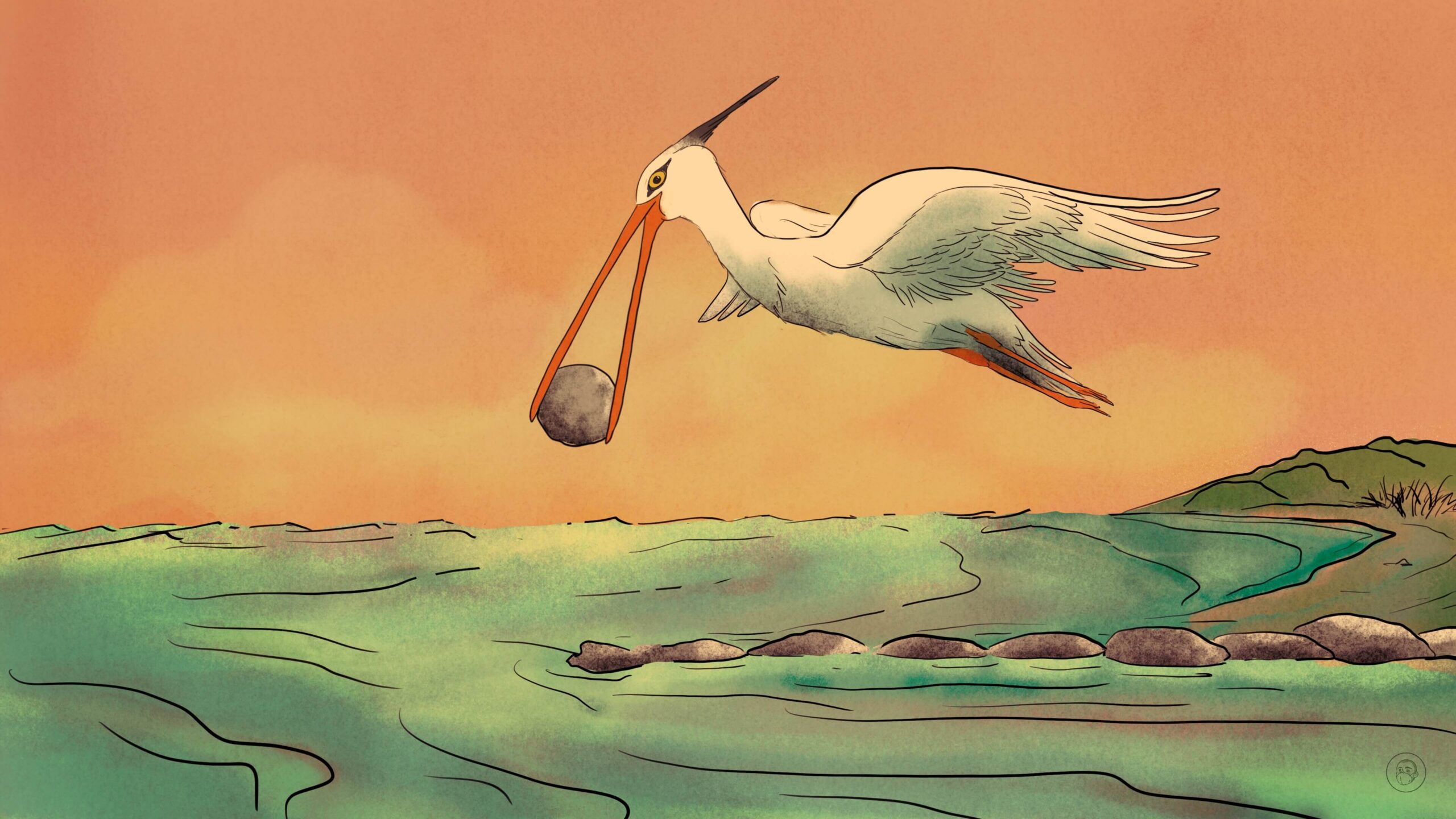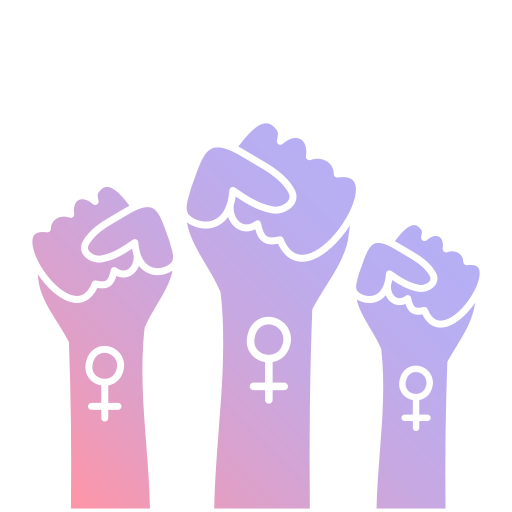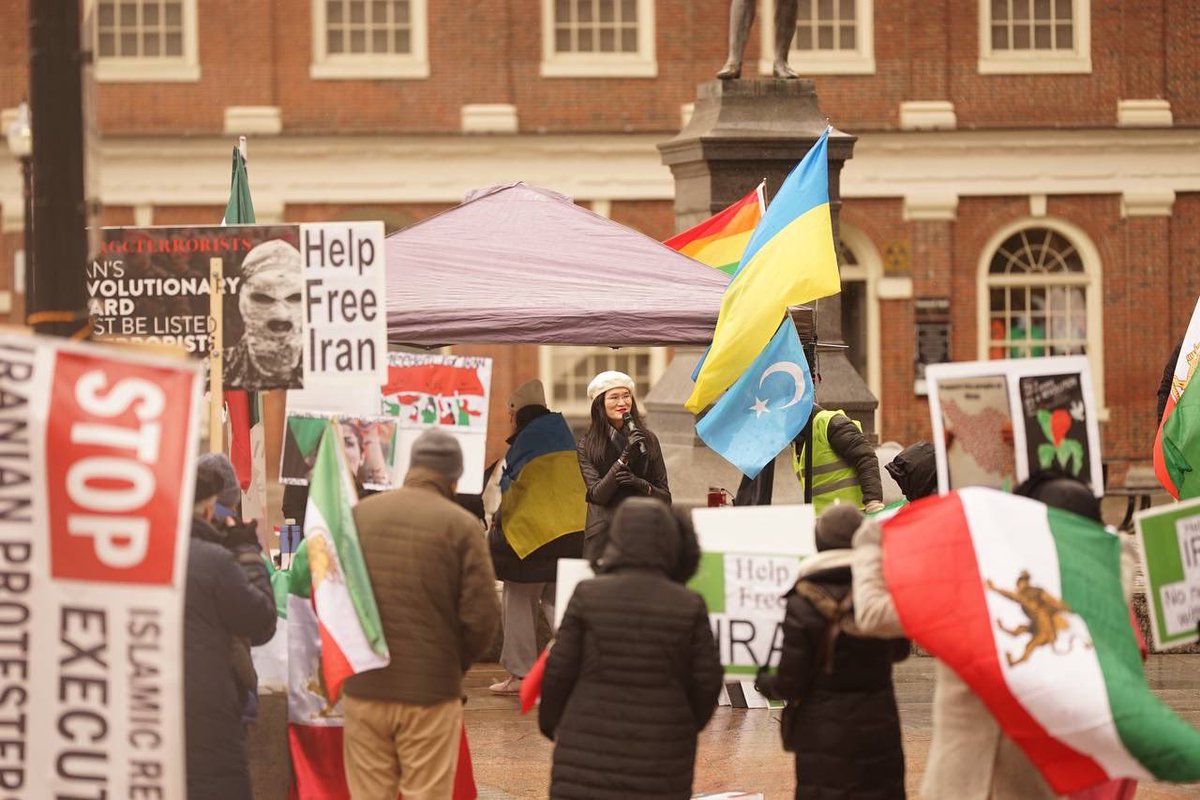‘Their fight is our fight’: A Chinese parable about women’s liberation
“In a world where women are free as all people are free, a stone is not a weapon and water is not a commodity; the most prized power is not the efficiency to kill but the ability to heal.”

“Women, life, freedom!” the crowd chants. It’s March 11, 2023, the first Saturday after International Women’s Day. Winter lingers amid fierce winds and icy rain. Despite the unforgiving weather, dozens have gathered at Boston’s historic Faneuil Hall to voice their support for women’s liberation.
The event is organized by the grassroots group From Boston to Iran, in coordination with local partners including Planned Parenthood, Boston Uyghur Association, and Boston Chinese Diaspora for Human Rights. Banners representing Iran, Ukraine, and the Uyghur homeland billow beneath an overcast sky. Next to a tent for Planned Parenthood, a set of posters tell the stories of several brave Chinese women, all of whom have been detained for the crime of speech: there are citizen journalists who tried to visit a sex trafficking victim or investigate the true cost of the COVID-19 pandemic in its early days, as well as individuals who participated in the “White Paper” protests last November against the draconian “zero COVID” policies. The words on the placards read: “Their fight is our fight.”
I have seen these posters before. A month ago, on February 5, they were on display at Boston Commons as part of the global commemoration marking the third anniversary of the passing of Dr. Lǐ Wénliàng 李文亮, the young ophthalmologist from Wuhan who blew the whistle on COVID-19 and later died of the disease. Back in January, I had accepted an anonymous invitation to speak at this rally. That Sunday, in front of haunting images of moral courage, I talked about my own journey to political awakening, the condition of exile, and the power of language. It was the first time I spoke at a political demonstration.
The commemoration for Dr. Li Wenliang was organized by the Boston Chinese Diaspora for Human Rights, one of the partner organizations for the International Women’s Day event. When one of its volunteers reached out a week ago, inviting me to speak again, I hesitated because of the short notice. Also, I did not know what to say for such an occasion. Next to speakers from Iran, Ukraine, and the Uyghur diaspora, who have endured war and persecution, my own experience as a Han Chinese woman living in the U.S. seemed trivial to the point of self-indulgence.
But I also recognize that victimhood is not a competitive sport, and oppression anywhere threatens freedom everywhere. To me, what’s more important than five minutes behind the mic is the opportunity to bear witness, to be a small part of this remarkable gathering, where the local is inseparable from the global, where diverse alliances illuminate new paths for emancipation. Despite intensifying crackdowns by Chinese authorities, the feminist movement in China has spread across the country’s territorial bounds and is sustained in the diaspora, where it has found new vocabulary and a more capacious cause in connection with liberation struggles elsewhere. For many overseas Chinese students and young professionals, the “White Paper” protests at the end of last year also marked their own “political coming-out” moment. Inspired by the astonishing acts of defiance in their birth country, they have taken part in and, like the group in Boston, organized solidarity events in their cities. A new political consciousness, rooted in inter-ethnic and transnational solidarity, is sprouting among a younger generation of the Chinese diaspora. To be in their presence gives me hope.
Halfway through the hour-long event, the icy drizzle has turned into flakes of snow. The heavens are moved by women’s struggle, one demonstrator says. The organizers hand out heating packs and lead more rounds of chanting, “to help everyone warm up.”
It’s my turn to speak. On this wintry Saturday afternoon, next to a towering statue of Samuel Adams, I walk up to the front of the crowd to deliver these remarks.

It’s such an honor to be here today in a gathering of sisterhood.
I’d like to begin with a story about stones and water, the hardest and softest of substances that make up our world. In China, my birth country, the landscape is dotted with cliffs and rocks that go by a common name: wàng fū 望夫, “in waiting for her husband.” Legend has it that once upon a time, there was a woman waiting for her man, who had left home for work or was called into battle. She stood there waiting, until her body transformed into stone.
One of the sites is by the upper stretch of the Yangtze River. It inspired a verse by the poet Shū Tíng 舒婷. “But could the heart really turn into stone?” she wrote in 1981. “Instead of standing over a cliff, in exhibition for a thousand years, it is better to cry on the shoulder of a loved one, for a single night.”
Shu Ting is one of my mother’s favorite authors. When I learned the poem in high school, my teenage self was struck by the hint of subversion, as it questions the millennia-old virtue of female chastity. Rereading these words two decades later remains a revelation.
Yet, as I picture the heroine by the cliff, I would like to reverse the narrative and rewrite the story. What if her desires were not for a return, a reunion, a repetition of the old, but for something new, a different life in another place? What if her hardened figure is not a monument to tradition but the embodiment of defiance?
She journeyed to the top of the mountain and stood by the river because it was as far as she could go, in a world that was never made for her. She stood at the edge so others after her could make it a new beginning. From the ancient atoms she has become, future generations find their genealogy.
I am the great-granddaughter of women with bound feet, for whom learning how to read was a revolutionary act. As I stand here today by the landmark of a past rebellion, seven thousand miles from where I was born and raised, I’m reminded that, for a woman, to travel by herself was — and in some places still is — regarded as a crime rather than a fundamental right. Once upon a time, the life I’m privileged to live was conceived in fugitive spaces. And spaces of fugitivity, like struggles for women’s liberation against patriarchy, must be transnational.
Borders, be they the fault lines between nations or walls of a prison, are not means of protection but instruments of violence. Like guns and missiles and armed agents of the state, borders uphold the patriarchal order. They sustain a masculine fantasy of bodily possession, penetration, and conquest.
In a world where women are free as all people are free, a stone is not a weapon and water is not a commodity; the most prized power is not the efficiency to kill but the ability to heal. A world where women are free as all people are free is not one where diverse faces are placed behind old ideas. The ideas must be made anew.
A little over a century ago, when the old world was dying and a new one was struggling to be born, a teenager named Mabel Lee, Lǐ Bīnhuá 李彬华, campaigned for women’s right to vote. Born in Canton in the final years of the Qing empire, Mabel moved to the U.S. as a child, studied at Columbia, and later became the first Chinese woman to earn a Ph.D. in economics in this country. Yet, even after the passage of the 19th Amendment in 1920, the Chinese Exclusion Act continued to deny Mabel U.S. citizenship. It would be decades before the suffragist was able to cast her first ballot.
A few years before Mabel Lee advocated for greater equality despite her own preclusion from it, on the other side of the Pacific, a 31-year-old Qiū Jǐn 秋瑾 was publicly executed for plotting to overthrow the Qing empire. The poet and revolutionary had left an unhappy marriage and later studied in Japan. In her last, unfinished volume, entitled Stones of the Jingwei Bird, Qiu Jin invoked a mythical creature who attempted to fill in the Eastern Sea stone by stone. She called upon fellow Chinese women to break off their shackles and stand up with passion, to ascend the stage of a new world and reconstitute the nation.
Less than five years after Qiu Jin’s death, the Qing empire fell.
So we have returned to another story about stones and water. To remake the ocean one stone at a time might seem like a futile effort. Yet history tells us that mountains can crater and rivers can dry. The Jingwei bird, born out of the spirit of a disobedient daughter, takes in sight of the waves that swallowed her body and dares to imagine otherwise. Against rising tides, when sorrow obscures the skies, she leaps into air in an incomparable act of faith.






